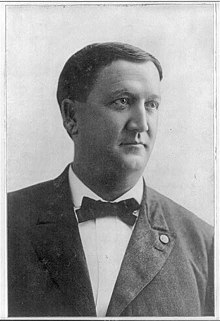
Back جيف ديفيس (سياسي) Arabic جيف ديفيس ARZ جف دیویس AZB Jeff Davis (Politiker) German جف دیویس (فرماندار آرکانزاس) Persian Jefferson Davis (kuvernööri) Finnish Jefferson Davis (gouverneur) French ג'ף דייוויס (מושל ארקנסו) HE Jeff Davis Hungarian 제프 데이비스 (아칸소 정치인) Korean
Jeff Davis | |
|---|---|
 | |
| United States Senator from Arkansas | |
| In office March 4, 1907 – January 3, 1913 | |
| Preceded by | James H. Berry |
| Succeeded by | John N. Heiskell |
| 20th Governor of Arkansas | |
| In office January 8, 1901 – January 8, 1907 | |
| Preceded by | Daniel W. Jones |
| Succeeded by | John Sebastian Little |
| 21st Arkansas Attorney General | |
| In office 1899–1901 | |
| Governor | Daniel W. Jones |
| Preceded by | E. B. Kinsworthy |
| Succeeded by | George W. Murphy |
| Personal details | |
| Born | Jefferson Davis May 6, 1862 Rocky Comfort, Arkansas, C.S. |
| Died | January 3, 1913 (aged 50) Little Rock, Arkansas, U.S. |
| Resting place | Mount Holly Cemetery, Little Rock, Arkansas, U.S. 34°44′15.3″N 92°16′42.5″W / 34.737583°N 92.278472°W |
| Political party | Democratic |
| Spouse(s) | Ina MacKenzie (1882–1910) Leila Carter (1911–1913) |
| Education | University of Arkansas Vanderbilt University Cumberland University (J.D.) |
| Profession | Lawyer |
Jeff Davis (born Jefferson Davis; May 6, 1862 – January 3, 1913) was an American Democratic politician who served as the 20th governor of Arkansas from 1901 to 1907 and in the U.S. Senate from 1907 to 1913. He took office as one of Arkansas's first New South governors and proved to be one of the state's most polarizing figures. Davis used his silver tongue and aptitude for demagoguery to exploit existing feelings of agrarian frustration among poor white farmers and thus built a large populist appeal.[1] However, since Davis often blamed city-dwellers, blacks, and Yankees for problems on the farm,[2] the state was quickly and ardently split into "pro-Davis" and "anti-Davis" factions.
Davis began his political career as Arkansas Attorney General, where he immediately began making political waves. His office challenged the legality of the Kimball State House Act and made an extremely-controversial extraterritorial interpretation of the Rector Antitrust Act. His fight to prevent trusts from doing business in Arkansas and the extreme lengths that he went to enforce his opinion would be a common theme throughout his political career. He gained credibility among the poor white farmers, who would become his base.
Davis's three two-year terms as governor "produced more politics than government,"[3] but he gained construction of a new state house and reformed the penal system. An almost-constant series of scandals and outrageous behavior characterized his time in office, which followed him when he won election to the Senate in 1906. Davis is often classified with such populist politicians as Benjamin Tillman, Robert Love Taylor, Thomas E. Watson, James K. Vardaman, Coleman Livingston Blease, and then Huey Long, controversial figures who were Southern demagogues, populists, and political bosses.
- ^ "Ozarks" (1988), pp. 5–7.
- ^ "Ozarks" (1988), pp. 11–13.
- ^ "Governors" (1995), p. 130.